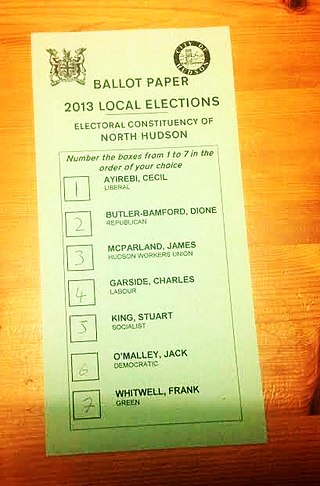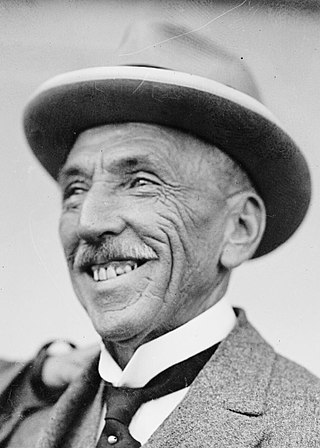
The AustralianHouse of Representatives is the lower house of the bicameral Parliament of Australia, the upper house being the Senate. Its composition and powers are set down in Chapter I of the Constitution of Australia.
The electoral system of Australia comprises the laws and processes used for the election of members of the Australian Parliament and is governed primarily by the Commonwealth Electoral Act 1918. The system presently has a number of distinctive features including compulsory enrolment; compulsory voting; majority-preferential instant-runoff voting in single-member seats to elect the lower house, the House of Representatives; and the use of the single transferable vote proportional representation system to elect the upper house, the Senate.
Electoral systems of the Australian states and territories are broadly similar to the electoral system used in federal elections in Australia.

The Australian Electoral Commission (AEC) is the independent statutory authority and agency of the Australian Government responsible for the management of federal Australian elections, by-elections and referendums.
Elections in Australia take place periodically to elect the legislature of the Commonwealth of Australia, as well as for each Australian state and territory and for local government councils. Elections in all jurisdictions follow similar principles, although there are minor variations between them. The elections for the Australian Parliament are held under the federal electoral system, which is uniform throughout the country, and the elections for state and territory Parliaments are held under the electoral system of each state and territory. An election day is always a Saturday, but early voting is allowed in the lead-up to it.

In electoral systems which use ranked voting, a donkey vote is a cast ballot where the voter ranks the candidates based on the order they appear on the ballot itself. The voter that votes in this manner is referred to as a donkey voter.

The Division of Wills is an Australian electoral division of Victoria. It is currently represented by Peter Khalil of the Australian Labor Party.
A group voting ticket (GVT) is a shortcut for voters in a preferential voting system, where a voter can indicate support for a list of candidates instead of marking preferences for individual candidates. For multi-member electoral divisions with single transferable voting, a group or party registers a GVT before an election with the electoral commission. When a voter selects a group or party above the line on a ballot paper, their vote is distributed according to the registered GVT for that group.

The Libertarian Party (LP), formerly known as the Liberal Democratic Party (LDP), is an Australian political party founded in Canberra in 2001. The party espouses smaller government and supports policies that are based on classical liberal, libertarian principles, such as lower taxes, opposing restrictions on civil liberties, decentralisation, uranium mining, and the relaxation of smoking laws.

The Commonwealth Electoral Act 1918 is an Act of the Australian Parliament which continues to be the core legislation governing the conduct of elections in Australia, having been amended on numerous occasions since 1918. The Act was introduced by the Nationalist Party of Billy Hughes, the main purpose of which was to replace first-past-the-post voting with instant-runoff voting for the House of Representatives and the Senate. The Labor Party opposed the introduction of preferential voting. The Act has been amended on several occasions since.
Instant-runoff voting (IRV) is a ranked voting method used in single-winner elections. IRV is also known outside the US as the alternative vote (AV). Today it is in use at a national level to elect the Australian House of Representatives, the National Parliament of Papua New Guinea, the President of Ireland and President of India. In Australia it is also used for elections to the legislative assemblies of all states and territories except Tasmania and the Australian Capital Territory, and for the Tasmanian Legislative Council.

In Australian politics, the two-party-preferred vote is the result of an election or opinion poll after preferences have been distributed to the highest two candidates, who in some cases can be independents. For the purposes of TPP, the Liberal/National Coalition is usually considered a single party, with Labor being the other major party. Typically the TPP is expressed as the percentages of votes attracted by each of the two major parties, e.g. "Coalition 50%, Labor 50%", where the values include both primary votes and preferences. The TPP is an indicator of how much swing has been attained/is required to change the result, taking into consideration preferences, which may have a significant effect on the result.
The Climate Change Coalition (CCC), briefly known as 4Change, was an Australian political party, which was formed in 2007 with a view to accelerate action by politicians from all parties on global warming and climate change. Its position on working towards addressing climate change stressed cooperation with big business in order to achieve significant progress on the issue. The party therefore advocated a close working relationship between environmentalists and the business community. The CCC was registered as a political party with the Australian Electoral Commission (AEC) on 4 September 2007 and deregistered on 25 March 2010.
A Langer vote was a style of voting in the Australian electoral system designed to avoid the requirement to express preferences for all candidates without the vote being rejected as informal. The title is a tribute to Albert Langer, an Australian political activist, who advocated for the use of this style as a de facto method of optional preferential voting for making a valid vote for the voter's preferred candidates while the deliberate "error" avoided the vote being counted for one of the major political parties.

The 1919 Australian federal election was held on 13 December 1919 to elect members to the Parliament of Australia. All 75 seats in the House of Representatives and 19 of the 36 seats in the Senate were up for election. The incumbent Nationalist Party government won re-election, with Prime Minister Billy Hughes continuing in office.
The 1918 Swan by-election was a by-election for the Division of Swan in the Australian House of Representatives, following the death of the sitting member Sir John Forrest. Held on 26 October 1918, the by-election led to the election of the youngest person to be elected until 2010 to the Parliament of Australia, Edwin Corboy. It saw the conservative vote split between the Country Party and the Nationalist Party, which directly prompted the introduction of preferential voting in Australia.

In Australia, how-to-vote cards (HTV) are small leaflets that are handed out by party supporters during elections. Voting in the Australian lower house uses a preferential voting system. Voters must rank every candidate on the ballot in order for their vote to count. There are often numerous candidates on the ballot, some with little public profile, so voters may find it difficult to decide on all of them. Parties produce how-to-vote cards ostensibly to help voters. They contain details about the candidate or party, as well as instruction on how to cast a ranked vote in the order that the party would prefer the voter follow. The flow of preferences can assist the party dispersing the cards directly and indirectly help allied parties.

The 2016 Australian federal election was a double dissolution election held on Saturday 2 July to elect all 226 members of the 45th Parliament of Australia, after an extended eight-week official campaign period. It was the first double dissolution election since the 1987 election and the first under a new voting system for the Senate that replaced group voting tickets with optional preferential voting.

The Australian Federation Party (AFP), also known as AusFeds and formerly known as the Country Alliance and the Australian Country Party, is an Australian political party. Founded in 2004 by four rural Victorians, the party lodged its initial registration with the Victorian Electoral Commission on 15 August 2005.

The 2026 Victorian state election is expected to be held on 28 November 2026 to elect the 61st Parliament of Victoria. All 88 seats in the Legislative Assembly and all 40 seats in the Legislative Council will be up for election, presuming there are no new electorates added in a redistribution.











